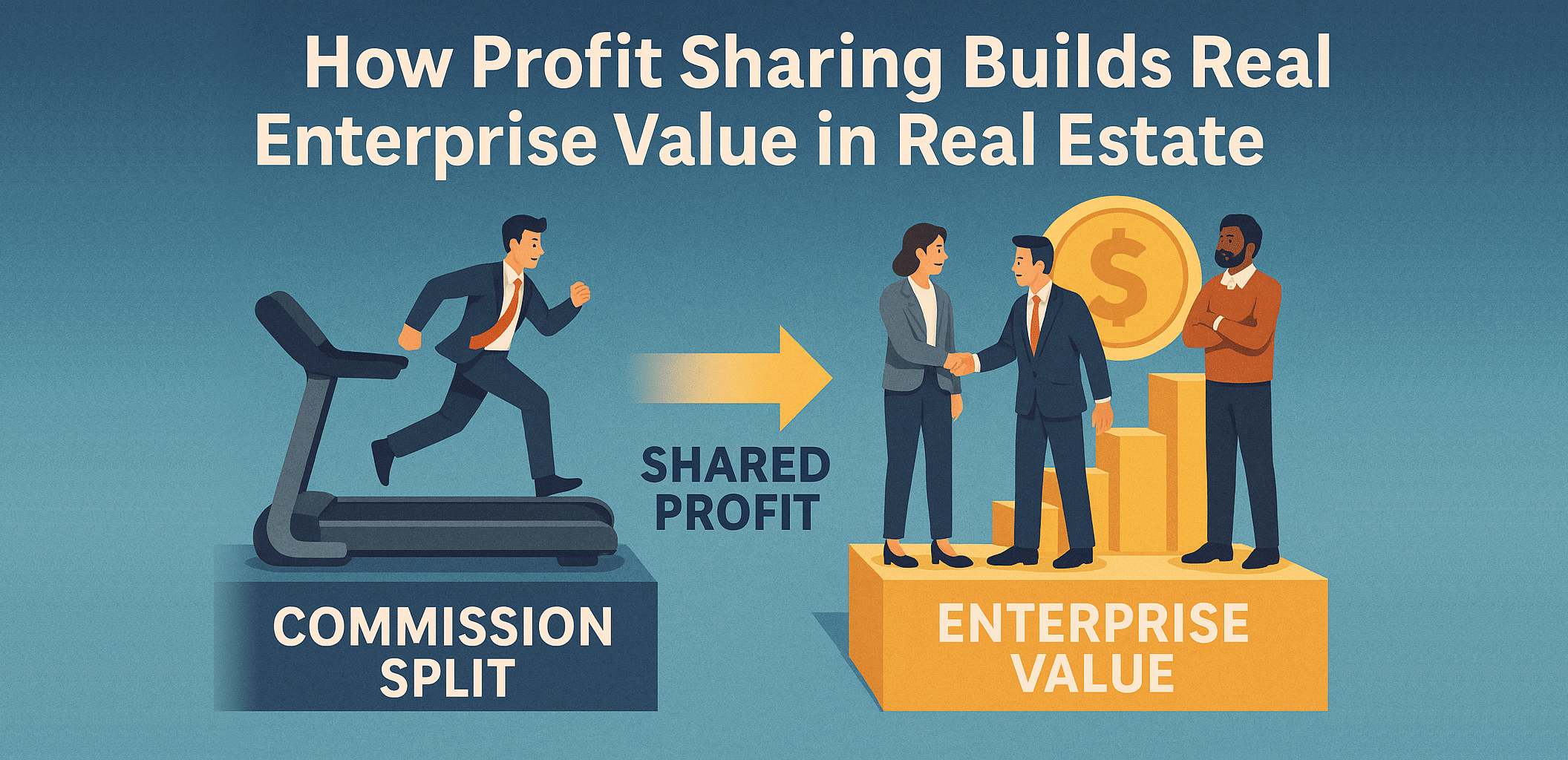How Profit Sharing Builds Real Enterprise Value in Real Estate

For decades, the real estate agency model has run on one engine: the commission split.
It dictates recruitment, defines loyalty, and shapes agency culture.
But the formula has limits. Commission splits drive speed, not stability. They reward individual sales performance, but not collective enterprise growth.
As Malaysia’s property market matures, agency bosses are discovering a new principle of long-term value: shared performance and shared profit. Profit sharing doesn’t replace commission splits — it completes them.
1. The Commission Split: A High-Speed Treadmill
| Weakness | The Hidden Cost to the Agency |
|---|---|
| Short-Term Focus | Agents prioritize instant closings over building systems, brand, or client relationships. |
| Zero Equity Growth | Top producers own nothing beyond their last cheque, so they constantly chase higher splits elsewhere. |
| Retention Liability | When a top performer leaves, all institutional knowledge and client data walk out with them. |
A commission-based agency runs on momentum, not memory. When the best producers move, the business moves with them.
2. The Profit Share Revolution: From Sellers to Stakeholders
A profit-share model transforms relationships from transactional to collaborative.
Instead of “You work for me,” the message becomes:
“We built this together.”
When key leaders share in the agency’s net profit, their mindset shifts from salesperson to stakeholder. The goal is no longer just individual commission — it’s collective efficiency and sustainable growth.
How the Mechanism Works
At the end of each cycle (monthly or quarterly), the agency calculates net profit after all fixed expenses and allocates a percentage — typically 10%–30% — to eligible leaders based on metrics such as:
- Team production volume
- Retention and compliance scores
- Strategic contribution (e.g., recruitment, training, system improvement)
This structure gives major team leaders true skin in the game. They begin to care about costs, compliance, and collaboration — the real levers of enterprise growth.
3. The Ultimate Win for Agency Bosses: Risk Mitigation
To the agency owner, profit sharing is not generosity — it’s risk management.
Bringing a top team leader into a profit-share arrangement means they now co-own part of the company’s performance — and its operating costs.
Shared Cost = Shared Responsibility
Once a leader participates in profit share, their mentality changes:
- They begin to monitor rental, staffing, and marketing spend.
- They contribute ideas to streamline operations.
- They defend the agency’s stability — because they benefit from every saving.
Retention Lock-In
They also think twice before leaving. They are literally walking away from the profit pool — and the enterprise value they helped create.
Profit sharing transfers part of the agency’s overhead risk to those most capable of managing it. It transforms leadership from an expense line into a co-investment partnership.
4. The Philosophical Divide: Takers vs. Builders
| Category | Commission Split System | Profit Share System |
|---|---|---|
| What It Rewards | Personal sales volume | Collective business performance |
| Agent Mentality | “I earn my percentage.” | “I help grow the company’s value.” |
| Ownership | Purely transactional | Shared risk and upside |
| Agency Exposure | 100% of overhead borne by owner | Partial cost shared with leaders |
Commission systems create takers.
Profit systems create builders.
5. The Hybrid Future: Split + Profit + Platform
The future isn’t either/or. It’s Ecosystem Economics — combining the best of all worlds.
A modern, scalable agency model includes:
- Base Split – Transparent, fair commission tiers (e.g., 70/30) that reward personal productivity.
- Profit Pool – A recurring allocation (10–15% of net profit) shared with key team leaders.
- Platform Investment – A centralized tech and operational infrastructure that supports both sides.
| Platform Feature | Profit Share Benefit |
|---|---|
| Verified Inventory Networks | Leaders co-invest in listing liquidity — creating faster turnover and internal trust. |
| Intelligent Systems | Shared accountability for compliance, documentation, and automation improves overall profit margins. |
| Data-Driven Insights | Collective data helps teams target high-growth areas and reduce wasteful spending. |
Profit sharing makes the platform model financially sustainable — because leaders become part of the infrastructure, not just users of it.
6. Building Organizations That Last
A commission-only agency sells transactions. A profit-sharing agency builds equity.
That’s the difference between a sales business and a true enterprise. Profit sharing helps leaders stay, clients stay, and systems stay — the three ingredients of a valuable brand.
For agency owners, the shift isn’t about generosity — it’s about creating durable value that survives beyond individual producers.











































































































